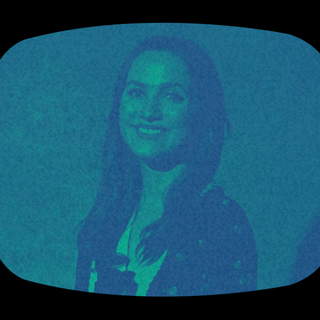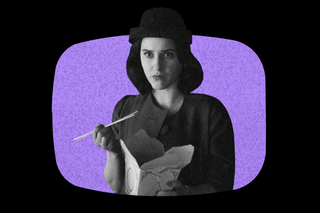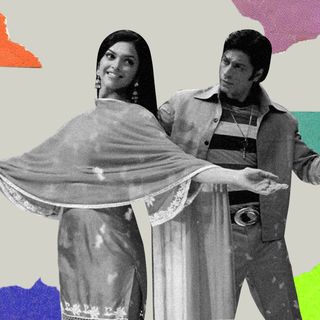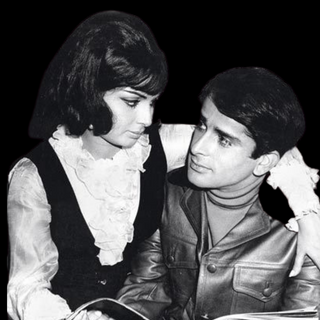
‘The Marvelous Mrs. Maisel’ Explores How We Can Never Completely Know Anyone
The show demonstrates how we find ourselves trapped by the fear of being judged while simultaneously judging people.

This article contains spoilers for Season 4, episodes 3 and 4 of The Marvelous Mrs. Maisel.
“Alex Borstein gave her Emmy performance,” one website announced, praising the speech Susie (played by Borstein) delivers at the funeral of her friend, Jackie. He was played by Brian Tarantina, who passed away in December 2019 — just a few weeks after the previous season of The Marvelous Mrs. Maisel was released. The show’s ode to the character — and by extension, perhaps, the actor — didn’t just serve as the emotional epicenter of episode three, where Borstein shined and the audience’s eyes glistened. The sequence served yet another purpose: to make us wonder whether we can ever completely know another person — no matter how close we might be to each other.
It’s a question we keep coming back to in episodes three and four of the show as we see just how much the characters don’t know about their friends, family members, offsprings, partners, closest associates — you name it.
Susie lived with Jackie. Yet, she never knew he considered her “one of his closest friends” — let alone knowing he fought in the war, won a bravery award, was a great dancer, owned a Babe Ruth-autographed baseball, or exchanged love letters with Darla, a woman Susie didn’t know existed.
This sets off a chain of revelations, where it soon becomes clear that nobody can confidently claim to know the people they love. It speaks to how we take our loved ones for granted — there’s a lot of detail that gets lost while we’re busy being the main characters of our lives.
Joel doesn’t have a clue where Mei Lin, the woman he’s been dating, lives.
And Joel’s family, in turn, doesn’t know he’s dating anyone at all. In fact, his mother is busy trying to set him up with potential matches.
Related on The Swaddle:
The Science Behind Why People Are Unkind to Those They Love
Midge’s father, Abe, didn’t know his best friend, Asher, and his wife, Rose, dated. The revelation, unfortunately, culminates in a rant that serves as yet another reminder of how men considered — and, of course, still do — women’s bodies as “goods” that can be “sullied.” Thankfully though, it wasn’t just me who cringed when he asked Asher, “What part of this woman’s body did you touch? …I’m going to mark them and I’m never going to touch those parts again;” the other characters did too.
Midge, too, doesn’t know a thing about Susie’s love life — or even her sexuality. Granted, though, that she’s not entitled to that information — especially since she does seem to have a problem with respecting people’s boundaries. Her track record shows that in her determination to prove how open-minded she is, her privilege-spawned perspectives lead her to ignore the raging homophobia that exists in the society she lives in.
We’re almost halfway into the season, and we’re yet to see her introspect her ill-fated set on Shy Baldwin, where she almost outed him as gay to a packed theater. It pivoted her steadily ascending career into a rapid descent, but she still hasn’t shown one sign of regret at her choice of jokes. So, if Susie truly indeed is attracted to women, as Midge suspects, I see why she would prefer not to come out to her.
In many ways, though, by exposing how little we know about the people we hold closest to us, the latest episodes of Mrs. Maisel show us why. It’s simple: we’re judgmental. Joel knows his parents are going to judge — if not downright disapprove of — his decision to date a Chinese woman. Their story, however, has another nuance: just like Midge, his privilege also shields him from truly grasping the degree of discrimination Mei Lin has to deal with on an everyday basis. As a result, he is also unaware of how traumatizing the experience must be, and keeps persuading her to meet his parents despite her refusal to deal with the racist remarks that she knows will inevitably ensue.
Abe, too, is scorned by his community for writing an honest review of a musical in the third episode of the season. We watch him tussle over his passion for writing honest theater reviews and his fear of almost certain derision for doing so. Does he overcome his fears completely, though? Perhaps, not, given how he refuses to tell Susie how frustrated he is about her overstaying at their house, and instead, tells her she’s welcome to stay as long as she wants to. Nonetheless, you’d think his experiences might make him realize how stifling the dread of impending judgment can be.
Related on The Swaddle:
Indian Adults Are Leading ‘Double Lives’ to Avoid Controlling Parents. But What’s the Hidden Cost?
But Abe himself explodes upon discovering the romantic history between Rose and his best friend. He doesn’t hold back his judgment despite the fact that not only over three decades had passed since they dated, but also that it was at a time when Abe himself had broken up with her with a vague, non-committal promise of return that said he “might come back” once he completed his Ph.D. Through Abe, the episodes demonstrate how we find ourselves trapped by the fear of being judged, but at the same time, reinforce the culture of judging people by actively participating in it — a takeaway that’s rather relevant in the age of “cancel culture” we’re living in.
When it comes to family, though, we tend to look at people as part of the unit we form, and often forget that they’re individuals in their own right too, as this podcast highlights. This might be the reason why he never registered Rose telling him — at least, “20 times,” in her words — about her relationship with Asher. I found myself asking: is it that we refuse to acknowledge anything that doesn’t fit our idea of the people in our lives? Is that one of the many reasons why we refuse to believe people’s lived experiences — not just because we think we know better, but because we are actively, but subconsciously, resisting the idea that we might not know them as well as we think we do?
To be completely honest here, though, do we even know ourselves? “How many times have you surprised yourself? Gotten angrier than you ever knew possible, to the point of scaring yourself? Faced a challenge that seemed insurmountable and excelled at it? Been hopelessly scared, then drawn upon a well of courage and grit that didn’t exist a moment before?” an article on Medium asks of its readers.
But while we may not fully know ourselves, it might be safe to assume that we know ourselves better than anyone else — after all, we’re the only ones who’ve been in our shoes, lived in our minds. Similarly — but not so much — while we can never know the people closest to us completely, we probably know parts of them that others don’t. The show brings this out at the start of Susie’s speech: yes, she regrets not knowing several facets of Jackie’s life, but she does know his laundry day, the list of foods that didn’t agree with him, and his snores.
As Libba Bray, an American author, had once said, “You can never really know someone completely. That’s why it’s the most terrifying thing in the world, really — taking someone on faith, hoping they’ll take you on faith too. It’s such a precarious balance. It’s a wonder we do it at all. And yet…”
Devrupa Rakshit is an Associate Editor at The Swaddle. She is a lawyer by education, a poet by accident, a painter by shaukh, and autistic by birth. You can find her on Instagram @devruparakshit.
Related


Overrated, Not: ‘Om Shanti Om’
